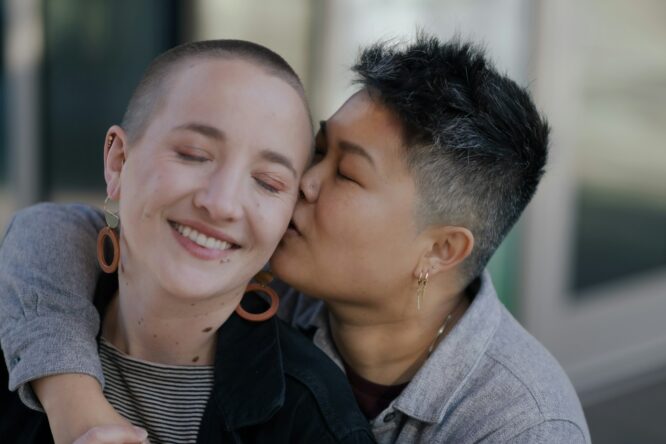Sometimes the people who aren’t right for you don’t mistreat you outright—they just slowly make you feel smaller, more drained, or less like yourself.

And while we all go through rough patches in friendships or relationships, there’s a difference between weathering life’s ups and downs and consistently shrinking in someone else’s presence. If you’re constantly second-guessing yourself, playing roles to keep the peace, or feeling lonelier in a group than you do on your own, it might be time to look closer at who’s around you.
1. You feel emotionally exhausted after spending time with them.

After hanging out, you don’t feel energised or connected—you just feel drained. It’s not that you’re introverted or tired from socialising. It’s the subtle tension of being on edge around people who don’t really see you or meet you where you are. When you constantly have to perform, manage their moods, or hold back parts of yourself, it becomes exhausting over time. If “quality time” consistently leaves you needing recovery time, something’s off.
2. You can’t be vulnerable around them.

If opening up always leads to judgement, minimising, or awkward silences, it trains you to keep your guard up. You might still laugh with them, but when it comes to the deeper stuff, you never quite feel safe enough to go there. Real connection involves risk. If every emotional moment feels like walking a tightrope, the friendship or relationship isn’t built on trust—it’s built on surface-level performance.
3. They mock the things you care about.

Whether it’s your hobbies, your job, or your taste in music, there’s a difference between playful teasing and consistent dismissiveness. If they’re always turning your passions into a punchline, it chips away at your self-worth. You shouldn’t have to defend what lights you up. The right people don’t just tolerate your interests—they’re curious about them, even if they don’t share them.
4. You leave every interaction second-guessing yourself.

If you often walk away replaying what you said, wondering if you offended someone or sounded stupid, that’s a sign of an emotionally unsafe environment. Constant self-editing is exhausting—and unnecessary around the right people. Healthy relationships make room for flaws, awkward moments, and growth. You should be able to show up as you are, not as a carefully crafted version of yourself.
5. They only reach out when they need something.

If you only hear from certain people when they’re venting, needing help, or asking for a favour, it might be a one-way dynamic. Being needed isn’t the same as being valued—and the difference becomes obvious over time. Support goes both ways. If you’re constantly giving without being checked on, celebrated, or heard in return, that’s not a friendship—it’s emotional labour with no balance.
6. They downplay your accomplishments.

Instead of celebrating your wins, they change the subject, make a joke, or compare it to something they’ve done. It doesn’t feel like support—it feels like a subtle push to stay small. You shouldn’t have to shrink your joy so someone else feels comfortable. People who truly care about you want to see you thrive, and they’ll let you have your moment without stealing it.
7. You never feel truly “yourself” around them.

If you have to filter your personality, interests, or humour just to fit in, that’s not belonging—it’s emotional shapeshifting. As time goes on, it leaves you feeling more disconnected than seen. When you’re constantly adjusting your energy, the friendship becomes a performance. Real connection happens when you don’t have to tone yourself down to be accepted.
8. They’re competitive instead of supportive.

A little friendly competition can be healthy, but if they treat your success like a threat—or always try to “outdo” you—there’s a lack of emotional safety. It becomes less about connection and more about comparison. Supportive people don’t keep score. They know your wins don’t take anything away from theirs, and they celebrate with you instead of using it as a reason to prove themselves.
9. They gossip constantly about other people.

If they’re always badmouthing other people behind their backs, it’s only natural to wonder what they say about you when you’re not around. Constant gossip often signals insecurity and deflection. It’s not just about being “mean”—it creates an environment where trust can’t grow. If you have to tiptoe around what you share, the relationship’s foundation is already unstable.
10. They make you feel guilty for having boundaries.

Healthy people respect your limits, even if they don’t like them. If someone sulks, pushes back, or punishes you every time you say no, it’s not love—it’s control. Boundaries aren’t rejection. If someone sees them as a personal attack instead of a healthy part of connection, they’re showing you they care more about access than respect.
11. They make your struggles about them.

Whenever you try to share something hard, they hijack the conversation or spin it into their own experience. Suddenly, you’re the one offering comfort, even when you were the one who needed it. This dynamic often leaves you feeling unseen and emotionally neglected. The right people don’t compete for attention when you’re hurting—they offer it freely.
12. They pressure you to be someone you’re not.

If you’re constantly nudged to act louder, be more “fun,” or ditch things you value just to match the group vibe, that’s not inclusion—it’s subtle rejection. You shouldn’t feel like a project or an inconvenience. The people around you should make space for who you already are, not just the version of you they’d prefer.
13. You feel lonelier with them than when you’re alone.

This is one of the most telling signs. If you leave hangouts or chats feeling emptier than when you started, that’s your gut quietly waving a red flag. True connection fills you up—even in small doses. If you’re constantly feeling dismissed, overlooked, or drained, being alone might actually feel more honest than being around them.
14. You feel like you’re always trying to prove your worth.

Whether it’s trying to impress them, be funnier, be more helpful, or just “earn your place,” that constant need to perform is a huge emotional cost. Real relationships don’t make you audition for belonging. If you’re always hustling for approval, it’s a sign the space around you isn’t safe. The right people make you feel like you’re enough—no proving required.




